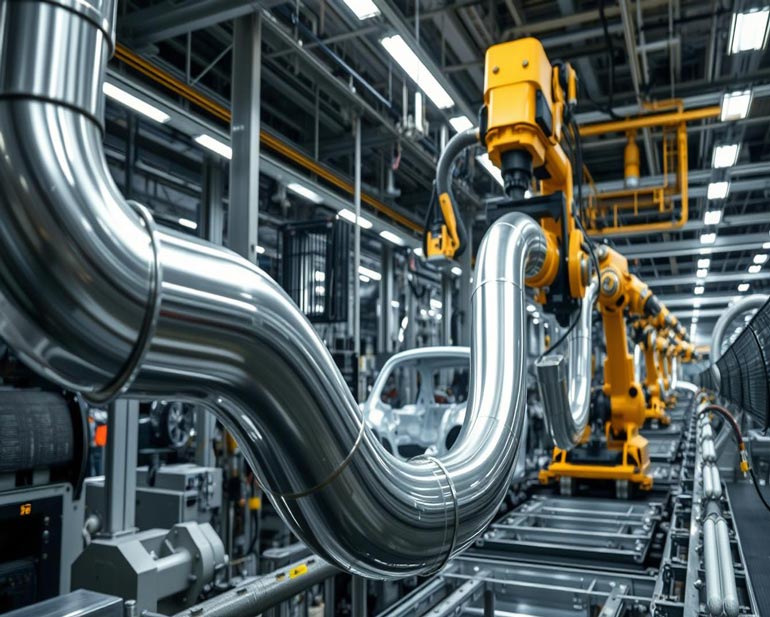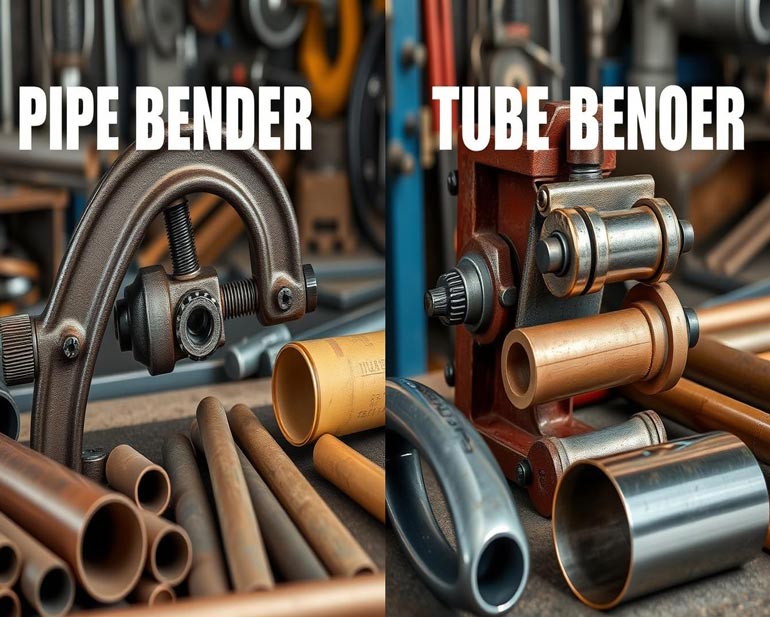明正精密機械へようこそ
パイプ曲げ機を選ぶには?

19 3月
正しいパイプ曲げ機を選ぶための重要なヒントをご覧ください。機能、精度、価格など、お客様のニーズに最適なものをお選びください。
パイプ曲げ機の選び方
製造ラインには精密機器が欠かせません。パイプ曲げ機はその点で際立っています。最適なパイプ曲げ機を選ぶことは、単にパイプを曲げることだけではありません。それは、貴社の生産の将来を後押しすることなのです。機械の種類、機能、革新性を理解することが重要です。
手動の機械は、小さくて繊細なチューブには最適です。職人技に伝統をもたらす1.一方、油圧式マシンは太くて大きなチューブをよく扱う。しかし、その精度は必ずしも一定ではないかもしれない12.電気機械がゲームを変えている。様々なサイズを正確に曲げることができ、より少ない電力で、より少ないメンテナンスで済みます。1.
お客様のニーズに最適なマシンは?材料、チューブサイズ、曲げ品質などの要素を考慮することが重要です。 BLMグループ は60年以上の経験を提供する。コストとキャパシティ・ニーズのバランスをサポート1.あなたの選択は、有益で永続的な投資につながるはずです。12.
すべての購入は生産ラインに深く影響します。当社のパイプベンダー購入ガイドは、機械の選択を、効率、品質、技術革新といった業界のコア・ニーズに結びつけています。ステンレス鋼用の強力な機械が必要な場合もあります。2.また、溶接や切断の手間を省く多用途マシンの恩恵を受ける人もいるだろう。3.今日の決断が明日の成果を形作る。

パイプ曲げ機カテゴリーの概要
さまざまなパイプ曲げ機を知ることは、今日重要なことです。より良いものを作り、一流の製品を保証するのに役立ちます。手動式から全電動式まで、多くの種類があります。どのタイプも様々なニーズによく合います。
手動式パイプ曲げ機
手動式チューブ・ベンダーは使いやすく、コストもそれほどかからない。完璧な精度を必要としない場合や、多くのものを作る場合に最適です。このような機械は、小さな仕事、工芸品、または創造性を発揮したいものを修理するのに適しています。あまりお金をかけずに、時々パイプを曲げる必要がある場合に便利です。45.
油圧式チューブ曲げ機
油圧式ベンディングマシンはパワフルで多くのことができる。物を作ったり、大きなものを作ったりするような大きな仕事に適しています。強力とはいえ、他の機械ほど速くなく、手入れが必要だ。しかし、大きくて太いパイプを上手に扱うことができるので、仕事によっては必需品となる。45.
全電動式パイプ曲げ機
オール電化マシンは大きな前進だ。速く、正確で、無駄がないことで知られている。多くのものを素早く作るのに最適です。エネルギーを節約し、素早くセットアップし、一貫性を保つことができる。BLM GROUPはこの技術をリードし、さまざまなことができるマシンを提供している。46.
時代の変化とともに、CNCオートメーションのような新しい技術が、これらのマシンをさらに優れたものにしている。パイプを超精密に曲げることができ、飛行機や自動車のような分野での厳しいニーズに応えることができる。456.
| タイプ | ユースケース | メリット | 制限事項 |
| 手動式パイプベンダー | 少量生産の職人的プロジェクト | コストパフォーマンスが高く、使いやすい | 精度が低く、生産が遅い |
| 油圧式パイプベンダー | 建設、重工業 | パワフルで太いパイプにも対応 | より広いスペースとメンテナンスが必要 |
| 全電動式パイプベンダー | 大量工業生産 | 高精度、高効率 | 高い初期投資 |
パイプ曲げ機を選択する際に考慮すべき要素
適切なチューブ・ベンダーを選ぶには、まず曲げ金型の種類を知ることから始まります。丸管用金型と角管用金型があり、それぞれの作業に対応しています。7.ベンドの中心線半径(CLR)と外周半径は、完璧なベンドを実現する鍵です。7.適切な金型は、HVACや航空宇宙など様々な分野の部品製造に役立ちます。7.作るものに合った金型を選ぶことが肝心です7.
パイプ曲げ機の特徴を見るとき、その選択は作業方法に影響します。手動式マシンは、小規模なカスタムメイドの作業に適しています。1.油圧式マシンは、より大きく太いチューブを扱うことができますが、より多くの維持が必要で、より多くの電力を使用します。1.電気機械は高精度でたくさんの部品を作るのに最適です。1.
マシンを選ぶということは、素材を考えるということでもある。銅やアルミニウムのような柔らかい金属は簡単に曲がります。1.マシンのサイズ範囲と曲げられる厚さを知ることは非常に重要である。1.多くのツールスタックを持つことで、金型を素早く交換でき、時間を節約できます。1.
機械の特徴をよく見てください。複雑な形状を作ることができれば、余分な部品や工程を省くことができます。1.品質、精度、柔軟性でマシンを選ぶ。これは、現在と将来に役立ちます1.
ベンディングマシンの仕様評価
パイプ曲げ機を選ぶ際には、そのスペックを知ることが重要です。これには、どのような材料に対応できるか、マシンのデザイン、完全なスペックなどが含まれます。これらの要素は、作業スピードや作るものの品質、特にタフな仕事に大いに役立ちます。
曲げ機械容量の決定
適切なベンディングマシンのサイズを見つけることは、費用対効果の高い良い仕事をするための鍵です。手動式、油圧式、CNC式、空気圧式など、多くの種類があります。それぞれ、自動車から飛行機まで、特定の作業に最適です。8.スチール、アルミ、PVCなど、どのようなパイプを使うかを考えることは重要です。素材が異なると、最終製品に影響を与える可能性があります。8.また、どれくらいの量を作る必要があるのかを知り、機械メーカーと相談して最適なものを作るのに役立ちます。8.
機械材料の互換性を理解する
機械が扱える素材によって、その機械の柔軟性や耐用年数がわかる。例えば、アルミやステンレスを曲げることができる電気機械は9 は、新しい技術がいかに機械をより良くするかを示しています。材料の強度と伸縮性を知ることで、適切な曲げ金型を選ぶことができます。これにより、あなたの曲げ加工が 右.
形状やデザインの柔軟性を考慮した機能評価
ベンディングマシンの設計スキルは、さまざまな曲げやパイプ形状をどのように処理できるかに表れます。CNCベンディングマシンは、余分な部品を必要とせず、多くの材料や形状に調整するのに適しています。9.多くの場合、タッチスクリーンと曲げパターンのメモリが付属している。これにより、複雑な曲げ加工がより簡単に、より安定したものになる10.

運用要件と能力の分析
パイプ曲げ機を選ぶ際には、何が必要かを知ることが重要です。これにより、効果的かつ効率的な金属成形が可能になります。
生産速度に関する考察
適切なマシンを選ぶことが、スピードのニーズに応える鍵です。CNCおよび電動ベンダーは、高速曲げ加工に最適です。素早く、正確にチューブを曲げます。1112.しかし、ゆっくりと大きな力で曲げる必要がある場合は、油圧ベンダーの方が優れている。油圧ベンダーは強力で、大きな圧力を扱うことができます。1112.
バッチサイズと運転頻度
一度にどれだけ曲げるかが本当に重要です。CNCベンダーとマンドレルマシンは、たくさんの曲げ加工に最適です。正確で信頼性があります。1112.どの程度の曲げを行うかを知ることは、最適なマシンを決めるのに役立ちます。どのくらいの頻度で、どのくらい曲げるかを考える1112.
また、道具を変える頻度とその費用を考えることも重要だ。これは利益に影響します12.
| ベンダーの種類 | 推奨使用法 | 生産性機能 |
| 電気/CNC | 大音量、高周波 | 高速で正確な曲げ加工 |
| 油圧式 | 低速、ヘビーデューティー | 厚い素材に適した堅牢な設計 |
| マンドレル | 高バッチサイズ生産 | チューブの完全性をサポートし、変形を最小限に抑える |
適切なベンディングマシンを選択するための考慮事項 特徴
適切なベンディングマシンを選ぶには、いくつかの重要なステップがあります。機能、信頼性、そしてコストです。自動車、建築、宇宙船などの分野では重要です。この選択では、精度と投資がどれだけ回収できるかを重視します。
ロータリードローベンダーは、その制御性と一貫した結果で知られています。精密な曲げ加工に最適です。13.CNCベンディングマシンは、要求の厳しい産業における複雑な曲げパターンに不可欠です。14.ベンディングマシンの特徴を見極めることは、あなたの目的に最適なものを見つけるために不可欠です。
航空宇宙産業や自動車産業では、正確な作業が不可欠である。13.
厚い材料を扱うには、強力なベンディングマシンが不可欠です。13.
ベンディングマシンのROIを評価する場合、価格だけではありません。継続的なコストと潜在的な利益向上について考えましょう。14.
パイプベンダーの品質は非常に重要だ。家具や豪華な建物のような製品では、仕上げがカギとなる13.
安全のため、最新の機械には非常停止装置とガードが付いている14.
| 特徴 | 重要性 | ROIへの影響 |
| 精密制御 | 航空宇宙と自動車に不可欠 | 高い |
| 安全メカニズム | オペレーターの安全確保に不可欠 | 中程度 |
| 電力容量 | 重工業用として必要 | 高い |
| 仕上げ能力 | 消費者向け製品にとって重要 | 可変 |
最後に、ベンダーの評判をチェックすることもお忘れなく。保証内容を確認し、デモを提供しているかどうかを確認する。14.このステップを踏むことで、賢くお金を使い、最高のマシン性能を発揮するための良いサポートシステムを見つけることができる。
素材と肉厚の影響を理解する
パイプの曲げ加工における材料の影響と肉厚の考慮は非常に重要です。これらはパイプ製作を効率的かつ効果的にするのに役立ちます。これらのことを知ることで、パイプを傷つけることなく正しく曲げることができます。
パイプには多くの材料が使われている。それぞれの材料は、曲げたときの挙動が異なります。例えば、銅やアルミニウムを曲げるには、より硬い材料よりも小さな力で曲げることができます。15.だから、適切な素材を選ぶことはとても重要だ。コスト、機能性、寿命のバランスを取るのに役立つ。
パイプの肉厚も重要だ。肉厚の厚いパイプを正しく曲げるには、より大きな力が必要です。これは、機械を正しくセットし、最高の働きをさせるために知っておくべき重要なことです。
ASME B31.3やB31.8のような規則は、パイプ壁の厚さに関するガイドラインを定めている。これらの規則は、さまざまな状況においてパイプの安全性と信頼性を確保するのに役立ちます。15.
| 素材 | 最小壁厚(インチ) | 推奨曲げ力(トン) |
| アルミニウム | 0.05 | 3 |
| ステンレス鋼 | 0.08 | 8 |
| 銅 | 0.04 | 2 |
オペレーターは、プレス曲げのような曲げ方法が肉厚にどのように影響するかを知っておく必要があります。曲げ半径と初期肉厚で最終的な強度が変わる15.また、ストレッチ・ベンドは、パイプの外側を伸ばすことで壁を薄くすることができる。15.
CNCパイプ曲げ機を使用することは、非常に役に立ちます。CNCパイプ曲げ機を使えば、曲げ力を非常に正確にコントロールできます。これにより、パイプの壁がちょうど良い状態に保たれます。また、CNC技術は非常に効率的で、自動車や船舶の製造において非常に重要です。16.
Pipe PTIのようなところの専門家と仕事をすることで、より良い材料を選ぶことができる。彼らは品質向上とコスト削減のためにあらゆることを考えてくれます15.
結論
正しいパイプ曲げ機を選ぶことは非常に重要です。単に機器を購入するだけではありません。いくつかの重要な要素を理解する必要があります。金属板曲げ機の販売台数は、2034年までに13億4,460万台に達すると予想されており、この業界は活況を呈しています。この成長は、製造のプロが賢く選ぶことがいかに重要かを示している。17.曲げ半径やマシンの厚み処理能力などを見なければならない。17.
業界の専門家には好みがある。約80%は、機械がいかにうまく曲がるかが重要だと答えている。また、65%が、正しい機械を選ぶには精度が重要だと考えている。18.柔軟性と様々なツールを持っていることも重要です。専門家の45%と70%は、これらの要素がさまざまなエンジニアの仕事に役立つと考えている。18.また、55%企業にとって、使いやすいプログラムを持つことは、効率化のために不可欠である。18.良い投資をするために、75%はコストと可能なリターンに注目する。75%は、ビジネスが長続きするためには、コストとリターンが重要だと考えている。18.
CNC油圧ベンディングマシンの用途は広い。自動車、航空宇宙、建築分野も含まれる。これらの機械は高精度で大きな力を提供する。17.企業が最適なマシンを選ぶお手伝いをする際、私たちは今、そして将来的に何が必要かを考えます。BLM GROUPやWoodward Fabのような一流メーカーとの協力が役に立ちます。彼らは深い知識を提供し、機械が今日の複雑な要件を満たしていることを確認します。

よくあるご質問
パイプ曲げ機を選ぶ際の主な考慮点は?
パイプ曲げ機を選ぶには、いろいろなことを検討する必要があります。マシンの最大サイズ能力、材料の曲がり具合や強さなどです。また、曲げ加工の精度、曲げ加工の種類、マシンの使用頻度、生産速度、工具への投資額とその投資に対するリターンなども考慮する必要があります。マシンがお客様の特定のニーズと製品の期待に応えられることを確認することが極めて重要です。
手動式、油圧式、電動式パイプ曲げ機の違いは何ですか?
手動式ベンディング・マシンは、シンプルで少量の加工に最適です。油圧式ベンディングマシンは、より大きなパイプを曲げることができ、より大きなパワーを提供しますが、速度が遅く、安定性に欠ける場合があります。一方、全電動式ベンディングマシンは、精度、効率、生産速度の点で一流で、使用する電力も少なくて済みます。複雑な曲げをたくさん作るのに最適です。
パイプ曲げ機の選定において、なぜ材料適合性が重要なのですか?
素材によって曲がり方が異なるため、素材の相性は重要です。材料の柔軟性と強度に適したマシンを選ぶ必要があります。選択を誤ると、曲がりが悪くなったり、マシンが破損したりすることもあります。
生産速度はパイプ曲げ機の選択にどのように影響しますか?
ベンディングマシンを選ぶ際、重要なのはスピードです。効率性を維持するために多くの部品を素早く作るには、高速の機械が不可欠です。部品点数が少ない場合は、精度を重視したより低速のマシンがコスト削減につながります。
パイプの曲げ加工における肉厚の影響は?
肉厚は曲げ加工に必要な力と安定性に影響する。肉厚が厚いほど、マシンに大きな力が要求される。薄い壁は、損傷を避けるため、注意して曲げることができるマシンが必要です。肉厚に適したマシンセッティングを行うことが重要です。
パイプ曲げ機は、複数の半径の曲げや複雑な形状に対応できますか?
確かに、さまざまな工具を使用できる機械なら、さまざまなサイズや複雑な形状の曲げ加工が可能です。しかし、特殊なチューブ形状やサイズには、特別なツールやセットアップが必要になるかもしれません。
パイプ曲げ機の電源の重要性とは?
機械の電源は、その性能、エネルギー消費、運転コストに影響する。電動式は、精密で素早い作業に適している。油圧式は、太いチューブや大きなチューブに強い力を発揮する。空気圧式は、素早く反復的な動きが必要な作業に適している。
パイプ曲げ機の運転要求とコストとのバランスは?
コストとニーズをバランスさせるために、マシンの機能とあなたが必要とする機能を比較してください。必要以上の機械にお金を払っていないことを確認する。効率はどうか、継続的なコストはどうか、将来的に用途を広げられるかどうかを考えよう。




